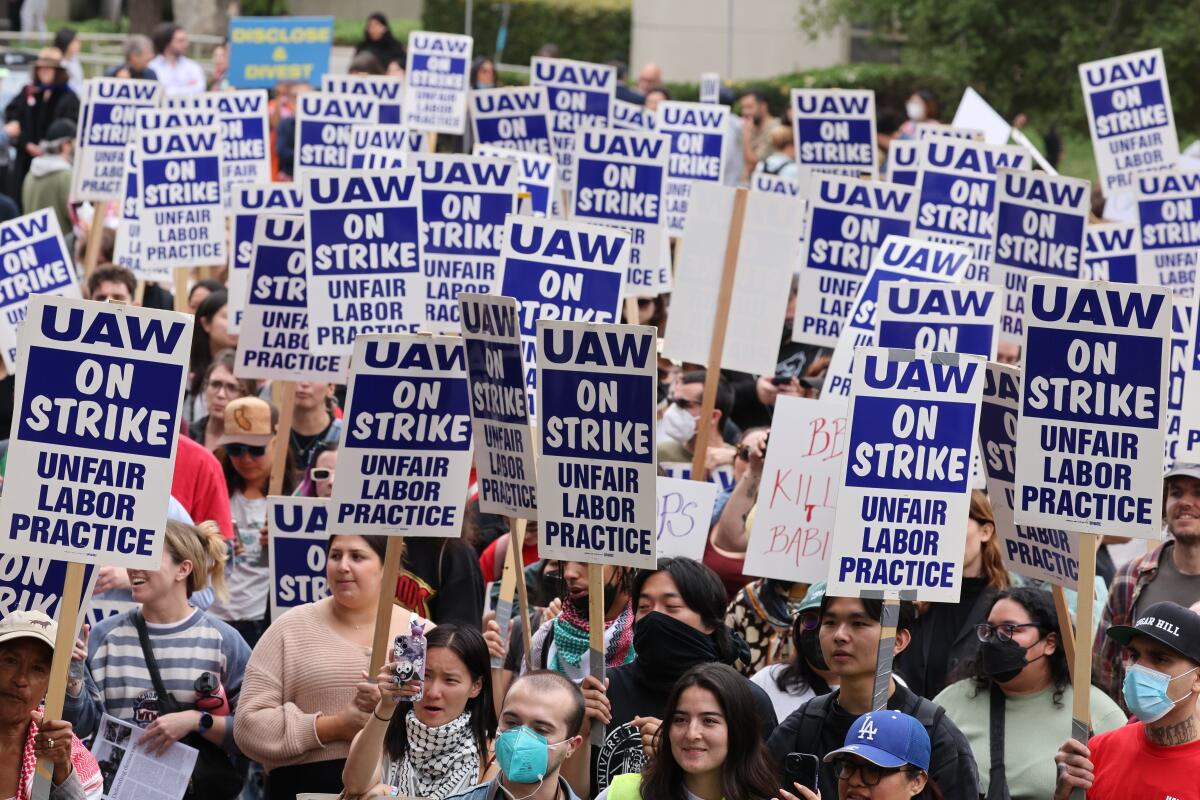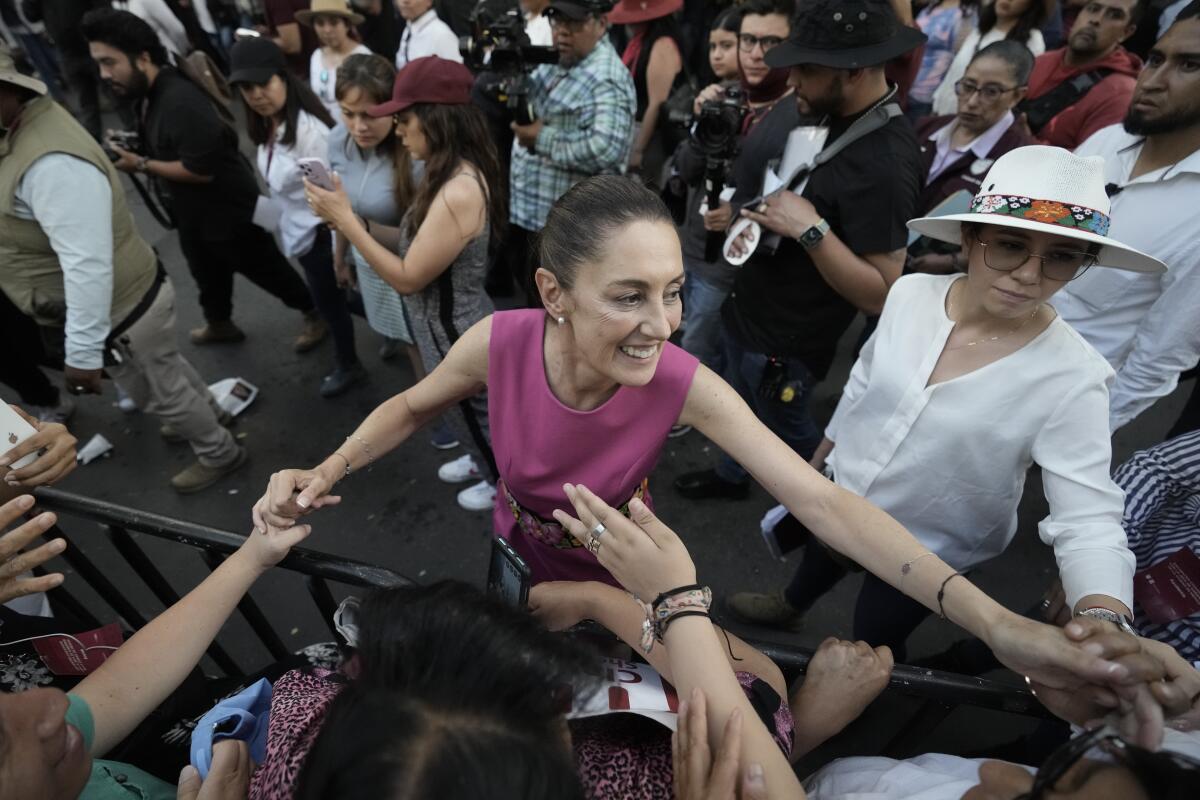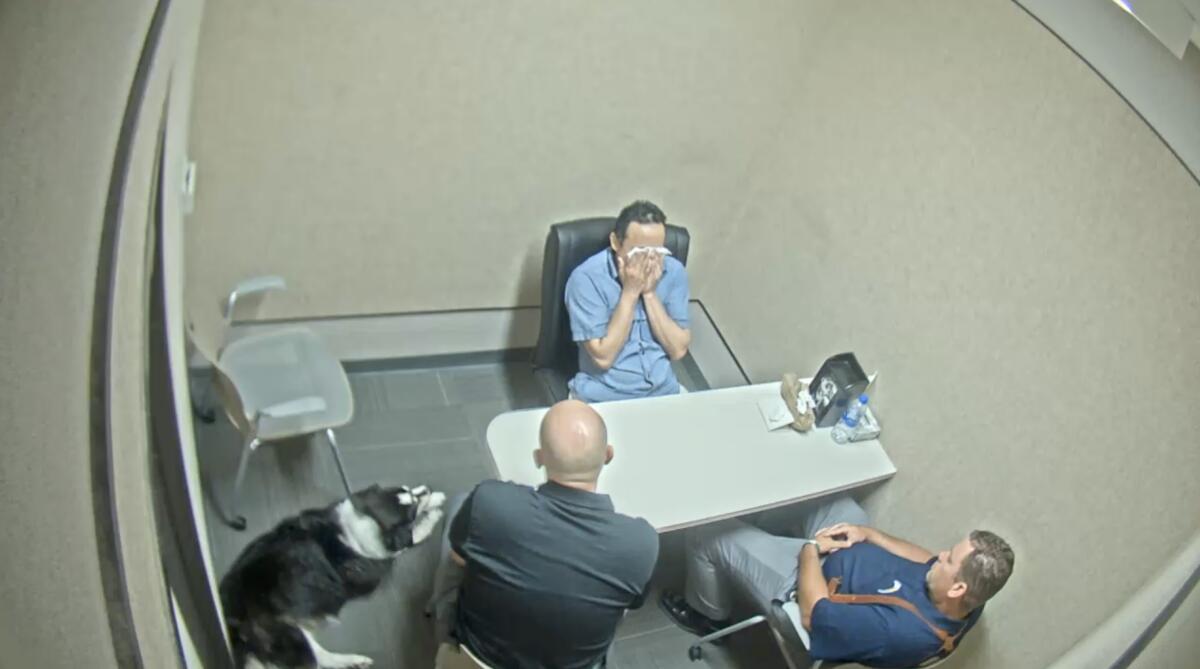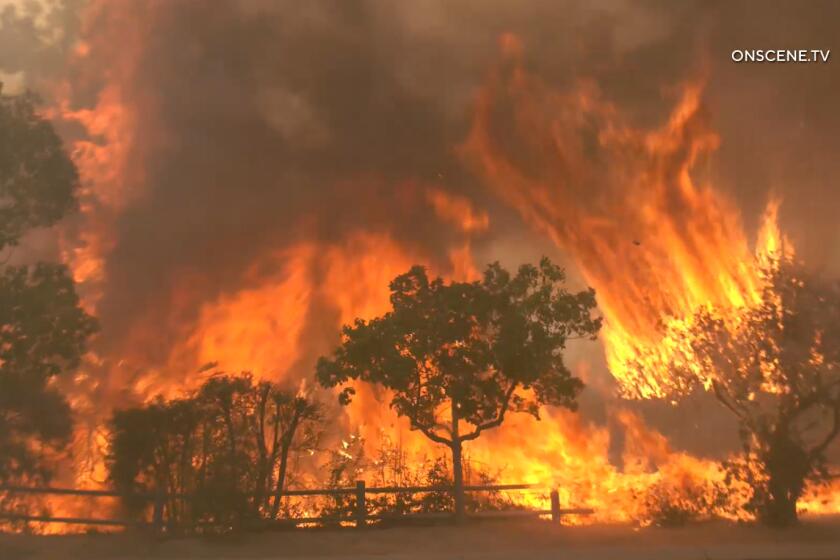UC workers strike blends traditional labor stoppage with pro-Palestinian fervor

Good morning, and welcome to the Essential California newsletter. It’s Sunday, June 2. I’m your host, Andrew J. Campa. Here’s what you need to know this weekend:
- Mexicans elect a new president today, their first female one.
- Northern L.A. County district weighs in on Trump verdict.
- And here’s today’s e-newspaper
Sign up for Essential California
The most important California stories and recommendations in your inbox every morning.
You may occasionally receive promotional content from the Los Angeles Times.
UC worker strikes are familiar and new in fervor
A typical union strike has a few common, core requests: better pay, robust benefits and safe working conditions.
The current academic worker strikes at UCLA, UC Davis and UC Santa Cruz certainly include traditional elements of a labor stoppage. Yet they also represent a merger of union accusations alleging workplace mistreatment with the goals of the wider pro-Palestinian campus movement.
On-campus chants have including phrasing such as “workers rights under attack,” with that message being tied directly to pro-Palestinian union members arrested and suspended after recent protests.
Traditional signs and marches have included a growing number of protesters waving Palestinian flags and wearing kaffiyehs, the black checked traditional scarves used to express Palestinian solidarity.
These marchers have pressed for demands mirroring those of the students they work with, namely for the University of California to divest its ties to Israel and the war in Gaza and grant all protesters amnesty from campus discipline.
While this merger has pumped new blood into the pro-Palestinian campus movements, it’s widened a gap between workers and administrators over its purpose and legality. Labor experts are split on how the unique demands of United Auto Workers Local 4811 could come to a precedent-setting end.
Who is striking and why
The 48,000-member union includes graduate teaching assistants, researchers and some academic workers who lead discussion groups, grade papers and administer exams, among other responsibilities at UC’s 10 campuses and the Lawrence Berkeley National Laboratory.
They walked off the job alleging their free speech rights to speak out about their workplaces were violated when UC leaders called in police to remove pro-Palestinian encampments at several campuses, resulting in arrests and suspensions.
They also contend the university violated their rights as workers by failing to protect them when a violent mob attacked protesters at UCLA, including union members, and police took hours to intervene.
The union bases the charges on the experiences of dozens of members who protested at UCLA, UC San Diego and UC Irvine. The union also says universities unilaterally changed their job conditions when classes were moved online amid protests instead of bargaining over those work-related decisions.
How have the UCs countered
UC Berkeley’s outgoing Chancellor Carol Christ said she supported examining Berkeley’s investments in “a targeted list of companies due to their participation in weapons manufacturing, mass incarceration, and/or surveillance industries” and would push University of California regents on divestment.
UC Riverside Chancellor Kim Wilcox said he would form a task force to “explore the removal of UCR’s endowment from the management of the UC Investments Office, and the investment of said endowment in a manner that will be financially and ethically sound for the university with consideration to the companies involved in arms manufacturing and delivery.”
UC leaders also said they are asking the state labor authority — the Public Employment Relations Board — to order the union to halt its strike during a critical ending period of the term with finals and grading at hand.
Legal debate
Unions have long played a role in elections and even supported foreign policy positions, “but this is different,” said David Lewin, a professor emeritus of management, human resources and organizational behavior at the UCLA Anderson School of Management.
“Striking workers are taking a risk in supporting one side of a two-party conflict,” Lewin said. “It looks opportunistic because you have employees of the university striking at the end of a quarter or semester when final exams are being given, grades are due and people have to graduate. It puts a lot of pressure on the university.”
Other labor experts take a different view.
The university’s messaging “is meant to intimidate the workers into not going on strike,” said Tobias Higbie, a UCLA professor of history and labor studies. “I wish the University of California would be a different type of employer, but apparently it’s not the way they want to go with this.”
What’s next
Mediation between UC and the UAW is ongoing, part of a multistep process that could drag far beyond the end of this quarter, which is mid-June at several campuses.
UC has also filed its own unfair labor practice allegation against the union, saying it violated its contract by striking.
For more on these strikes, here’s an analysis by Times reporter Jaweed Kaleem.
The week’s biggest stories
International politics
- Mexico’s presidential race is between two women. So why is everyone talking about one man?
- She’s likely to be Mexico’s next president. Can she save the country from cartel violence?
- LGBTQ+ Pride Month is starting to show its colors around the world. What to know.
Public health
- The FLiRT subvariants are rising: How bad will a California summer COVID wave get?
- The more women followed this diet, the longer they lived.
- Third U.S. dairy worker comes down with avian flu; officials monitoring farm.
- What the rise of the caesarean section reveals about pregnancy and childbirth in the U.S.
Trump conviction
- Guilty: Trump becomes first former U.S. president convicted of felony crimes.
- ‘Outrageous!’ ‘Tears of Joy.’ Hollywood reacts to Trump’s guilty verdict with rage, rapture.
- How Trump’s conviction will — and won’t — impact his 2024 chances.
- Three things about the Trump conviction that should be getting more attention.
- The jury has spoken. What happens next will be a great test of American democracy.
- Trump plans to raise money in California in the aftermath of felony conviction.
- ‘Stormy’ filmmakers explain how Daniels helped convict Trump: ‘Let’s give the woman her due.’
Crime, courts and policing
- Actor Nick Pasqual arrested at border for brutal stabbing of makeup artist, charged with attempted murder.
- New details emerge in killing of ‘General Hospital’ actor Johnny Wactor.
- Fresno’s Roman Catholic diocese to file for bankruptcy as new sexual abuse claims soar.
- Eight girls arrested after Bay Area middle school brawl.
- Off-duty LAPD officer shoots, kills unarmed man after altercation.
- L.A. city employee badly mauled by dog at Harbor animal shelter.
- He was a leading art dealer. Now, the 80-year-old could face more than a decade in prison.
Environmental issues, animal welfare
- Indigenous nations approve historic water rights agreement with Arizona. It now goes to Congress.
- Solar project to destroy thousands of Joshua trees in the Mojave Desert.
- If Gavin Newsom is a climate champion, why did he just crush community solar?
- Can satellites combat wildfires? Inside the booming ‘space race’ to fight the flames.
- Shocking before-and-after photos show California’s famed Clear Lake turn bright green.
- Man fatally shoots bear cub near Lake Tahoe, angering residents.
- Shooters in helicopters will not gun down Catalina’s mule deer population after all.
- You’re early: Cougar leaps into backyard near future site of Annenberg Wildlife Crossing.
- Are pet dogs and cats the weak link in bird flu surveillance?
- California’s surfboard-mooching sea otter has returned to Santa Cruz for the summer.
Pro-Palestinian protests
- Kaffiyehs and pickets: UCLA, UC Davis workers strike over treatment at pro-Palestinian protests.
- Police arrest dozens of pro-Palestinian protesters at UC Santa Cruz.
- San José State professor suspended over pro-Palestinian work.
Sports news
- Drew Gordon, ex-UCLA player and brother of Nuggets star Aaron Gordon, dies in crash.
- A look at the Lakers’ possible roster moves this offseason.
- Made it! California climbers use pioneering techniques to summit Mt. Everest.
- Mike Tyson’s ulcer flare-up postpones Jake Paul fight. 57-year-old must rest ‘for a few weeks.’
- Sharlize Palacios brings peace and passion to UCLA’s Women’s College World Series run.
Television, Entertainment news
- The very L.A. lessons at the heart of reality TV smash ‘Vanderpump Rules.’
- KTLA weathercaster Mark Kriski suffers ‘mild stroke’ on heels of colleague Sam Rubin’s death.
- ‘Completely heartsick’ Jennifer Lopez cancels summer tour to spend time with family.
- The 2024 Emmys BuzzMeter looks at the awards possibilities.
- Copyright infringement lawsuit against Bad Bunny, Karol G and others can move forward, judge rules.
- Queer Black women shine at timely museum shows by Mickalene Thomas and Simone Leigh.
- Angelina Jolie and Brad Pitt’s daughter Shiloh petitions to drop her dad’s surname.
More big stories
- Marian Robinson, mother of Michelle Obama, dies at 86.
- Metro train kills pedestrian walking across tracks in South L.A., closing Vernon Station.
- Trader Joe’s to open eight new SoCal stores. Here’s where they will be.
- Topanga Canyon Boulevard to reopen Sunday, months ahead of schedule.
- Why do Los Angeles yards have so many fruit trees?
- Everywhere you need to eat in Vegas right now, on and off the Strip.
Get unlimited access to the Los Angeles Times. Subscribe here.
Column One
Column One is The Times’ home for narrative and longform journalism. Here’s a great piece from this week:
Thomas Perez Jr. first felt anxious that something bad might have happened to his father, Papa Tom, on an August night in 2018. Papa Tom — people called Thomas Perez Sr. that — had put their family dog, Margosha, on her leash for a quick walk to the mailbox in their Fontana neighborhood, though it was nearly 10 p.m. But now, here was Margo back alone, the leash hanging off her collar, and Papa Tom nowhere to be found. Not at the mailbox, not at the neighbors, not at the nearby park.
More great reads
- Detectives coerced him into a false murder confession with lies. It’s perfectly legal.
- How Beyond Meat is trying to get its sizzle back.
- They bought homes with the intention to refinance. Now they’re stuck.
- A guide to mental health in Vietnamese.
- Chili crisp capitalism meets a new wave of Asian American cynicism.
How can we make this newsletter more useful? Send comments to essentialcalifornia@latimes.com.
For your weekend
Going out
- 📽️ The five-day Los Angeles Latino International Film Festival wraps up in Hollywood today, starting at 10 a.m.
- 🏳️🌈 West Hollywood’s kickoff celebration to Pride Month ends Sunday, with festivities starting at noon.
- 🎶 Sherman Oaks is hosting its annual Spring Concert and Festival with cotton candy and balloons for the kids.
Staying in
- 🛡️ HBO’s docuseries “Ren Faire” debuts Sunday and lays out succession battles at the Texas Renaissance Festival.
- 📺 Actor Jeremy Renner makes his return after a near fatal accident in “Mayor of Kingstown” on Sunday.
- 🧑🍳 Happy National Rotisserie Chicken Day! Here’s a savory recipe for this dish.
- ✏️ Get our free daily crossword puzzle, Sudoku, word search and arcade games.
L.A. Affairs
Get wrapped up in tantalizing stories about dating, relationships and marriage.
Because I was the newbie at the school, I wanted to get to know everyone, so I organized a dinner with my colleagues at a fun rock ’n’ roll sushi bar on Lankershim Boulevard. Steve was obsessed with sushi so he attended, and we sat across from each other, vibing to the blaring music and talking and flirting all night. Tokyo Delve’s was just crazy that night with great rock music, and I went wild and danced on the chairs. I hoped that my co-workers — especially Steve — didn’t think I was too overzealous.
Have a great weekend, from the Essential California team
Andrew J. Campa, reporter
Carlos Lozano, news editor
Check our top stories, topics and the latest articles on latimes.com.
Sign up for Essential California
The most important California stories and recommendations in your inbox every morning.
You may occasionally receive promotional content from the Los Angeles Times.








